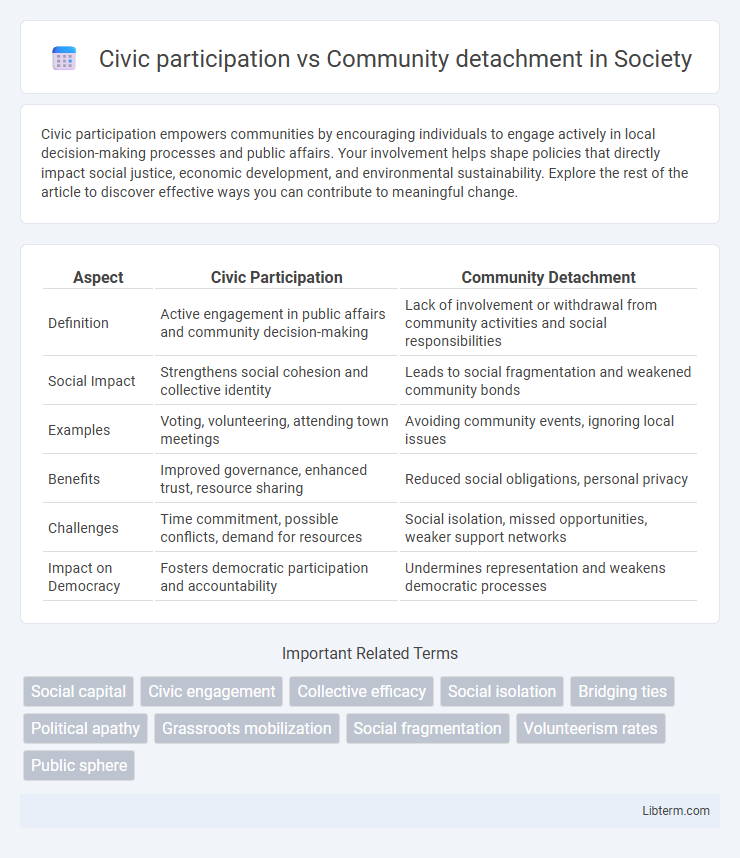Civic participation empowers communities by encouraging individuals to engage actively in local decision-making processes and public affairs. Your involvement helps shape policies that directly impact social justice, economic development, and environmental sustainability. Explore the rest of the article to discover effective ways you can contribute to meaningful change.
Table of Comparison
| Aspect | Civic Participation | Community Detachment |
|---|---|---|
| Definition | Active engagement in public affairs and community decision-making | Lack of involvement or withdrawal from community activities and social responsibilities |
| Social Impact | Strengthens social cohesion and collective identity | Leads to social fragmentation and weakened community bonds |
| Examples | Voting, volunteering, attending town meetings | Avoiding community events, ignoring local issues |
| Benefits | Improved governance, enhanced trust, resource sharing | Reduced social obligations, personal privacy |
| Challenges | Time commitment, possible conflicts, demand for resources | Social isolation, missed opportunities, weaker support networks |
| Impact on Democracy | Fosters democratic participation and accountability | Undermines representation and weakens democratic processes |
Understanding Civic Participation
Civic participation involves active engagement in community activities, such as voting, volunteering, and attending local meetings, which fosters social cohesion and democratic governance. Understanding civic participation requires analyzing factors like education, socioeconomic status, and trust in institutions that influence individuals' willingness to engage. Higher levels of civic participation correlate with stronger community bonds and improved public outcomes, contrasting sharply with the social isolation characteristic of community detachment.
Defining Community Detachment
Community detachment refers to the state in which individuals feel disconnected or disengaged from their local social networks, often resulting in reduced trust, participation, and shared community identity. This phenomenon leads to lower involvement in civic activities such as volunteering, voting, or attending public meetings, weakening the social fabric and collective efficacy of neighborhoods. Understanding community detachment is crucial for addressing barriers to civic participation and fostering stronger, more resilient communities.
Historical Trends in Civic Engagement
Historical trends in civic engagement reveal fluctuations in voter turnout, volunteerism, and public meeting participation, often influenced by social movements and political climates. The mid-20th century experienced robust civic participation linked to civil rights activism, contrasting with recent decades marked by rising community detachment and declining trust in institutions. Empirical studies show that socioeconomic factors, education levels, and media consumption patterns significantly correlate with these shifts in engagement and detachment.
Factors Driving Civic Participation
Civic participation is driven by factors such as education levels, social trust, and access to information, which empower individuals to engage actively in community decision-making and public affairs. Strong social networks and a sense of belonging encourage collective action and sustained involvement, while economic stability provides the resources and time necessary for participation. In contrast, community detachment often arises from social isolation, lack of political efficacy, and limited access to civic education, inhibiting meaningful engagement in local governance.
Causes of Community Detachment
Community detachment often stems from socioeconomic disparities, lack of trust in local institutions, and limited access to social networks or public resources. Factors such as economic instability, political disenfranchisement, and ineffective communication channels contribute to residents feeling isolated from civic activities. This detachment undermines collective action and weakens community cohesion, reducing overall civic participation rates.
Impacts on Social Cohesion
Civic participation strengthens social cohesion by fostering trust, shared values, and collective action within communities, leading to increased cooperation and resilience. In contrast, community detachment erodes social bonds, resulting in weakened networks, reduced mutual support, and heightened social fragmentation. Empirical studies show that municipalities with higher voter turnout and civic engagement report lower crime rates and better public health outcomes, underscoring the critical role of active involvement in promoting societal well-being.
Civic Participation and Local Governance
Civic participation enhances local governance by fostering active citizen engagement in decision-making processes, leading to more responsive and transparent institutions. Higher levels of voter turnout, public consultations, and volunteerism strengthen accountability and resource allocation tailored to community needs. Conversely, diminished civic involvement often results in community detachment, weakening governance efficacy and reducing public trust in local authorities.
Digital Era: Bridging or Widening the Gap?
The digital era transforms civic participation by enabling real-time engagement through social media platforms and online petitions, increasing accessibility for diverse populations. However, digital divides in internet access and digital literacy risk exacerbating community detachment, as marginalized groups may remain excluded from key civic conversations. Effective digital inclusion strategies and equitable technology distribution are essential to bridge the gap and foster inclusive civic engagement.
Strategies to Foster Civic Engagement
Implementing participatory decision-making platforms enhances civic participation by empowering residents to influence local policies directly. Establishing inclusive community programs and regular town hall meetings helps bridge the gap of community detachment by fostering social bonds and shared responsibility. Leveraging digital tools like social media campaigns and interactive apps increases accessibility and engagement among diverse populations, promoting sustained civic involvement.
Building Resilient Communities
Civic participation strengthens social cohesion by encouraging active involvement in local decision-making, enhancing trust and cooperation within communities. Community detachment undermines resilience, leading to weakened social networks and reduced capacity to respond to crises. Building resilient communities requires fostering inclusive civic engagement to promote mutual support and collective problem-solving.
Civic participation Infographic

 libterm.com
libterm.com